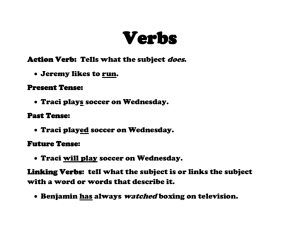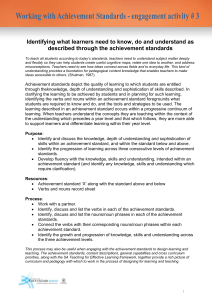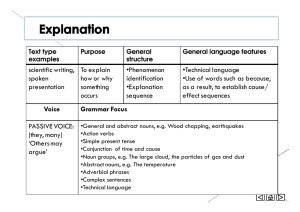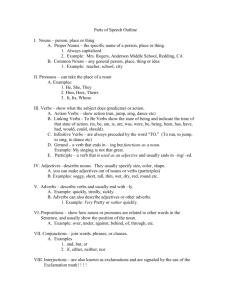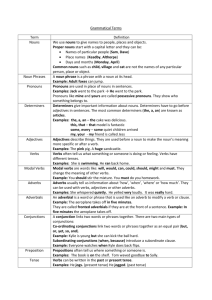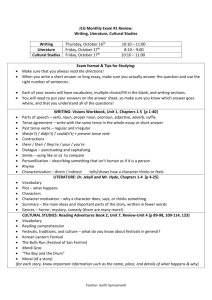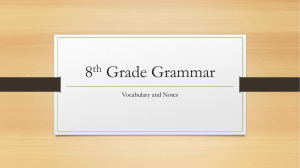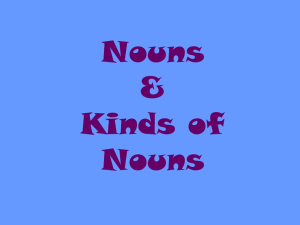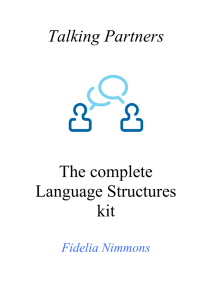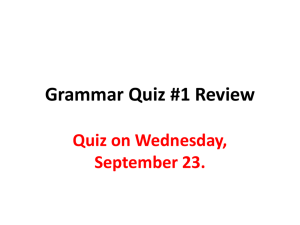- Oxford University Press
advertisement
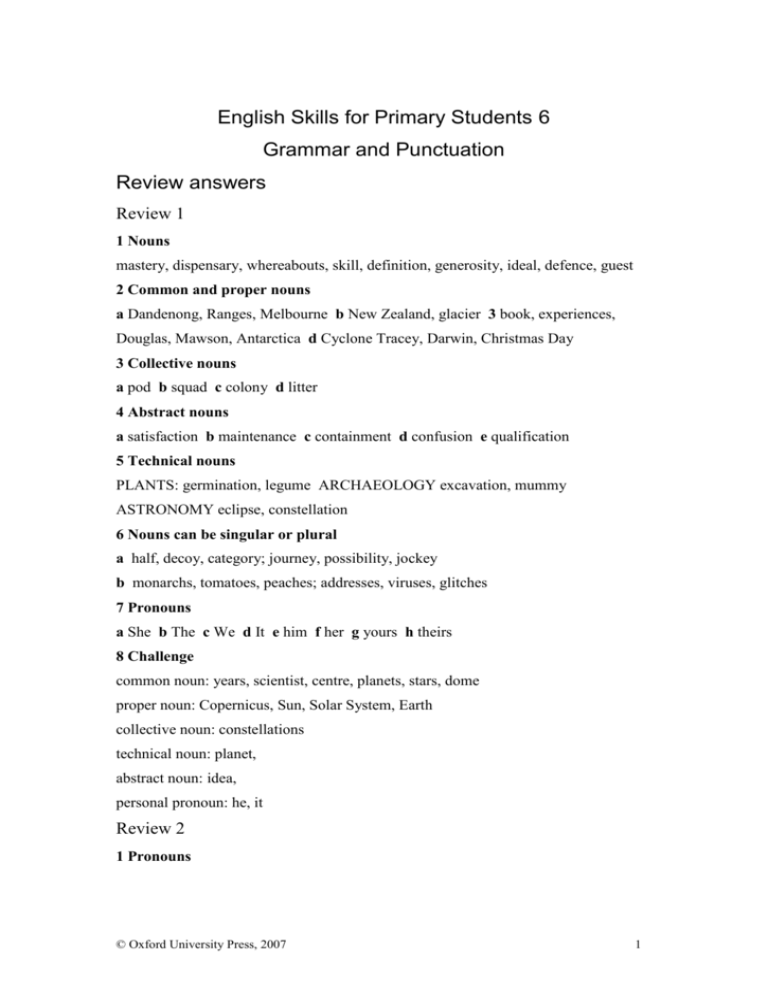
English Skills for Primary Students 6 Grammar and Punctuation Review answers Review 1 1 Nouns mastery, dispensary, whereabouts, skill, definition, generosity, ideal, defence, guest 2 Common and proper nouns a Dandenong, Ranges, Melbourne b New Zealand, glacier 3 book, experiences, Douglas, Mawson, Antarctica d Cyclone Tracey, Darwin, Christmas Day 3 Collective nouns a pod b squad c colony d litter 4 Abstract nouns a satisfaction b maintenance c containment d confusion e qualification 5 Technical nouns PLANTS: germination, legume ARCHAEOLOGY excavation, mummy ASTRONOMY eclipse, constellation 6 Nouns can be singular or plural a half, decoy, category; journey, possibility, jockey b monarchs, tomatoes, peaches; addresses, viruses, glitches 7 Pronouns a She b The c We d It e him f her g yours h theirs 8 Challenge common noun: years, scientist, centre, planets, stars, dome proper noun: Copernicus, Sun, Solar System, Earth collective noun: constellations technical noun: planet, abstract noun: idea, personal pronoun: he, it Review 2 1 Pronouns © Oxford University Press, 2007 1 a i that ii who b i That ii that c i Who ii What 2 More pronouns a My cousins and I b Lina and I c Ben and me 3 Adjectives a Several, that b Few, their c interesting d tiny, huge 4 More adjectives a her b this c its d worst 5 Adjective phrases a with fruit b with bunk beds c on the left d with the hands-on science experiments 6 Verbs a raced (doing) b are (relating) c struck (doing) 7 Change to past tense (Answers are the simple past tense. Other compound verb answers possible.) a refused b arrived c waited 8 Challenge relative pronoun: who adjective: motor, road, safety, driving adjectival phrase: who break the road rules, in some cases, relating verb: are present tense verb: reduce, by educating, by making, are made, contain, break, can be, can have, taken, can be sent Review 3 1 Compound verbs; past and present tense a was built (past) b has been lost (past) c were sunk (past) d are using (present) 2 Using helping verbs to show tense a past b present c future d present 3 Using verbs that agree a is b are c were d am 4 Contractions a didn’t b There’s c haven’t d didn’t e hasn’t © Oxford University Press, 2007 2 5 Adverbs a sadly, how b overnight, when c down, where d ferociously, how 6 Adverbs and adjectives a loudly b loud c continuously d continuous 7 Adverbial phrases a in the sun (where) b with a loud thud (how) c with the coach (with whom) d with my grandparents (with whom) 8 Challenge a compound verb: have changed, was built, were built a contraction: weren’t an adverb: greatly an adjective: first, large, suburban an adverbial phrase that tells where: in Australia’s cities an adverbial phrase that tells when: since the 1950s, In 1956, At the same time Review 4 1 Clauses (The subject is underlined, the verb is italicised and the object is bold.) a The technician adjusted the computer settings. b Jake tried a different controller. c Alhazen invented the pinhole camera. d The map shows the main towns. 2 Joining and dividing sentences a i Ewan turned the handle but the door did not open. ii Don’t go into that pen or the ram will butt you. b i One of the orang-utans was on the ground. The other was in a tree. ii Ancient Greeks didn’t wear anything on their feet inside. Outside they wore sandals. 3 Complex sentences a The armour was very heavy because it was made from metal. b The boat slipped its moorings because it had not been properly secured. c After the snows melted the rivers were full. d As the balloon filled with hot air it began to lift. 4 Punctuating sentences a What is a trireme? b Stop! c Why does that work? 5 Punctuation © Oxford University Press, 2007 3 a The last batsman is at the crease. (capital letter) b Ankara is the capital of Turkey. (full stop) c Jake’s journey was uneventful. (apostrophe) 6 Punctuation: direct speech a “Where is the game on Saturday?” asked Sam. b Matti replied that she would be there in five minutes. (other answers are possible) 7 Punctuation: apostrophes a bike’s b car’s c truck’s 8 Challenge “I want you to collect these things: a red pebble, a leaf, a bird’s feather and a cicada shell,” said Miss Habib. “How long do we have?” Ella asked. “Just thirty minutes; you’ll have to be quick,” Miss Habib replied. © Oxford University Press, 2007 4

